It takes a great team to build an equally great product. Centre Stage exists to tell the behind-the-scenes stories of the people building brilliant products and services in Africa.
I’m bringing Tobi Lufadeju to Centre Stage because I admire how determined she is to succeed in her role and how invested she is in her personal and professional development. Even when she has moments where she feels like a small fish in a big sea, she doesn’t allow her youthful insecurities to slow her down or get in the way of her responsibilities.
Two weeks after my meeting with Feranmi, I’m back at Eric Keyser to meet with a very nervous but confident Tobi Lufadeju who is a young product manager at Reliance HMO.
What were you doing in your early 20s? When I was Tobi’s age, I was wrapping up my MFA (Master of Fine Arts) in English literature and overthinking my future and career path.
At Reliance, Tobi is in charge of the consumer business unit.
“The consumer business unit is basically the retail side of the business. But I don’t just handle retail products – I also handle products for SMEs and our partners.”
Curiousity is a product manager’s super power
Tobi describes herself as a curious person, so I had to ask how curiosity plays a role in her work:
“Product management is the intersection of business, technology and design. Successful product managers need to learn a little bit about each of them because we do a lot of directing in our work. In my role, I have an overview of what everyone is working on – from the frontend engineers to the DevOps team.”
When Tobi uses the word ‘directing’, I immediately picture a sharp-minded captain steering a large ship in open waters. The captain is responsible for not only the ship but her diverse team of crew members and cabin hands. Should aspiring product managers expect to manage diverse teams? This is what Tobi had to say:
“Yes, they absolutely should have that expectation. As the product manager, you are the product’s encyclopedia; so if the head of marketing needs information about the product, you have to know enough to give an appropriate answer. Being a curious person helps me learn as much as I possibly can about what we are building.”
When you picture product managers, what do you see them doing? Crunching numbers? Creating colourless spreadsheets? Tracking the lifespan of a product? Counting app downloads? What does their day-to-day work life look like for Tobi?
“I prioritize the work we are doing at all times and carve out time to do the work. I collaborate with different people and communicate our products’ progress reports so everyone on the team knows what they need to do. I also make out time to speak to my direct supervisor – the business lead – and realign myself with our goals and plans for the quarter.”
Winning the battle over Impostor Syndrome
Product managers not only have to speak their product’s language, but they also have to speak their team’s language. How then do successful product managers navigate team management?
“There’s a common myth that product managers are micromanagers; this isn’t the case with me,” Tobi said in-between bites of her chicken sandwich.
“Although I operate as a kind of middle man, I don’t meddle with the work. I trust my team to do what they are skilled at and leave them to run on their own. I also remember to connect with them as human beings. Yeah, I have to meet my deliverables but I have to support my team as well.”
There are an estimated 64 million young people aged between 15 – 35 years old living in Nigeria. It’s obvious that our youth population is increasing rapidly with no plans of slowing down. But how prepared are they to enter local and global workplaces? How do young managers deal with issues such as impostor syndrome?
“The first two months on the job were not easy. I joined an existing team which meant that I had to do a lot of learning and observation in the beginning. My team members would throw around in-house language during meetings and I also had to figure out how to speak the engineering team’s language. I dealt with impostor syndrome big time.”
When you get hired by a new company, you have to make your first 100 days count. But being the newbie hire can be a daunting experience. How can new employees quieten the insecure voices in their heads and trust their abilities and skills?
“Even though the learning curve was steep in the beginning, I had to figure it out. I couldn’t afford to fail because that’s my name on the line. So whenever I felt confused after a meeting, I would call one of my team members back and ask questions. I still have moments where I’m confused about certain things but I’ve been given the leeway to experiment and try different tactics.”
Centre Stage tip: When in doubt or confused, ask questions.
Tips and tricks for aspiring and existing product managers
Earlier in our conversation, Tobi mentions how important it is to be curious on the job. I asked her what other skills she believes aspiring product managers need to be excellent in their roles?
“I’ll start with effective communication. You can’t just tell people what to do, you have to help them understand what needs to be done, why it needs to be done, and who needs to do it. If you cannot communicate clearly, you will not get the results you desire.
Prioritisation is the second skill. Successful product managers must own the product and visualize the bigger picture at all times. When you have the bigger picture in your mind, it’s easier to assign priority levels to different tasks.
Finally, you need interpersonal skills. Although my team members don’t directly report to me, I still have to learn how to speak to them with respect and empathy. When we have long weeks, I ensure I check in on the engineers because, at the end of the day, we are humans and need breaks from time to time.
Product managers need to learn how to give praise and encouragement, especially when they notice their team members are stressed or when their energy tanks are empty.”
Tobi’s role at Reliance HMO is her first stab at being a product manager. In addition to learning on the job, she’s also had to invest her personal time in picking up new knowledge about her responsibilities and that of her team. So, what is she doing to improve her skills?
“Practice. I consciously track what I’m doing and how I’m doing my work. I make out time to reflect on my progress regularly. I follow product leaders and managers on LinkedIn– I read their articles and make note of the tips they share. I also use Blinkst to read books at an accelerated pace. At one point, I had access to Masterclass, I took some business and product-focused courses. My business lead also sends me resources like podcasts and articles.”
Where your professional career is concerned, one thing you never stop doing is learning. Tobi is ambitious about being successful in her role and isn’t afraid to do what it takes to achieve her definition of success. My key takeaway from my conversation with Tobi is that managers, no matter how young or experienced they are, must be courageous, curious, and competent.
“If I had to share any tip with aspiring product managers, I would recommend researching what goes into being a product manager and taking one or two courses about what tools you need to use and what to do on the job. If you are on social media, follow conversational product leaders and engage with them on Twitter or LinkedIn. There’s a lot to learn at once and the work hit me like a wrecking ball in the beginning.
Measure as objectively as you can. You cannot fit everything into an OKR or KPI framework. Sometimes, you have to use your intuition to measure yourself and how well you are succeeding as a manager and team member. How are you handling your team? Are you driven by impact or are you working for the sake of it? If you are focused on making an impact, you will always deliver value to the business.”





















